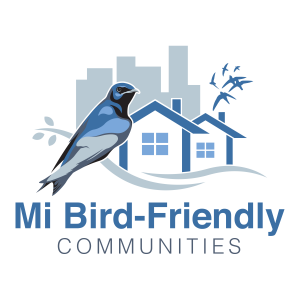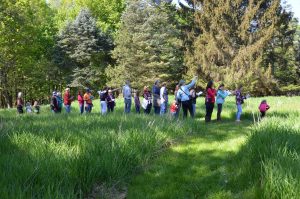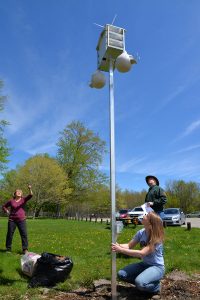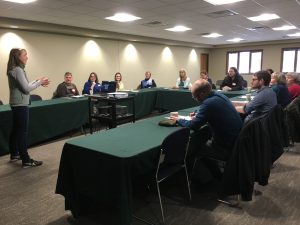FOR IMMEDIATE RELEASE
 Lansing, Mich. (February 1, 2018) — As the populations of many bird species throughout Michigan continue to dwindle, Michigan Audubon is enlisting the help of numerous groups throughout the greater Lansing region to improve the outlook for urban birds. With funds from a grant recently awarded by the National Fish and Wildlife Foundation’s Five Star and Urban Waters Restoration Program, Michigan Audubon will collaborate with diverse partners including units of local government, businesses, nonprofits, schools, and community groups to launch a new Bird-friendly Communities Initiative. The program will engage the local community in urban bird conservation programs designed to connect these communities with birds and the environment for the benefit of all.
Lansing, Mich. (February 1, 2018) — As the populations of many bird species throughout Michigan continue to dwindle, Michigan Audubon is enlisting the help of numerous groups throughout the greater Lansing region to improve the outlook for urban birds. With funds from a grant recently awarded by the National Fish and Wildlife Foundation’s Five Star and Urban Waters Restoration Program, Michigan Audubon will collaborate with diverse partners including units of local government, businesses, nonprofits, schools, and community groups to launch a new Bird-friendly Communities Initiative. The program will engage the local community in urban bird conservation programs designed to connect these communities with birds and the environment for the benefit of all.
Michigan Audubon Conservation Science Coordinator Rachelle Roake said, “The Mi Bird-Friendly Communities Initiative will encompass a suite of programs to engage citizens in urban conservation education, species-specific conservation, native landscaping, and hazard reduction for migratory birds. Our goal is to create a community-wide, landscape-scale impact for birds and people.”

Michigan Audubon Executive Director Heather Good leads a family-friendly bird walk on International Migratory Bird Day at the Capital City Bird Sanctuary in Lansing, Mich.
Outreach, education, and publicly-accessible habitat improvements will play an important role in the success of the program. “We believe the Mi Bird-Friendly Communities program will inspire environmental wonder and stewardship among city residents, community members, and local businesses, and we envision this program to be the start of a statewide change for Michigan to improve urban areas for birds and people alike,” said Heather Good, Executive Director of Michigan Audubon.
Partners in the program include Ingham County Parks, City of Lansing Parks and Recreation, Capital Area Audubon, Old Town Commercial Association, Michigan Environmental Council, Sierra Club Central Michigan Chapter, Woldumar Nature Center, Wild Ones Red Cedar Chapter, Okemos Public Library, Wildtype Native Plant Nursery, Designs By Nature, Hammond Farms, Montessori Radmoor School, and the Unitarian Universalist Church of Greater Lansing. As the program grows, Michigan Audubon plans to continue to build partnerships with additional entities.

Michigan Audubon Conservation Science Coordinator Rachelle Roake works with dedicated volunteers Rick and Penny Briscoe to install a Purple Martin house at the Ingham County Parks Lake Lansing boat launch.
Habitat improvement projects will take place at a number of locations throughout the greater Lansing region. Volunteers will work to remove invasive plants and to restore a wet meadow area at Michigan Audubon’s Capital City Bird Sanctuary, a 65-acre public urban bird sanctuary located in Delta Township that includes over a half mile of frontage along the Grand River.
Nesting/roosting structures for Purple Martins and Chimney Swifts, both human-dependent bird species, will be installed in public parks, schools, and other community hubs to not only increase available nesting and roosting locations, but to raise awareness for the conservation needs of these two species that, without widespread help of informed citizens, will continue to experience population declines. Native gardens will be installed on the properties of at least three partner organizations including schools, libraries, and places of worship.
In addition, educational signage will be installed at each project site. Roake said, “This signage will be designed to teach visitors about the role each project plays in urban conservation and to increase overall awareness, understanding, and involvement in conservation. Our ultimate goal is to inspire citizens to join us in our efforts, or get involved in similar projects in their community. Most of these projects can also be scaled so that people can take action in their own backyards to create even more bird-friendly habitat in our neighborhoods.”
Program elements also include the development of educational materials and a variety of citizen science opportunities, hands-on workshops, presentations, events, and celebrations designed to engage a wide and diverse audience. Youth engagement is a critical piece of conservation, and Michigan Audubon will continue its efforts to involve youth and families through several events, materials, and a unique summer camp curriculum. Woldumar Nature Association Executive Director, Kevin Wernet, said, “We are excited to strengthen scientific knowledge and environmental stewardship. With nearly 400 children enrolled in our summer camps and over 3,500 attending our school programs, our greatest outreach is to Lansing area youth and the prospect of partnering to enrich those children’s experience through this project is thrilling!”

Representatives from Mi Bird-Friendly Communities partner organizations meet to kick off the initiative.
Good added, “We are grateful to the National Fish and Wildlife Foundation and our partner organizations for this exciting opportunity to improve the urban landscape for wildlife and to share in the learning and stewardship of this important work. We are delighted that such a diverse group is eager to make urban bird conservation a topic of conversation throughout Michigan’s capital city. We look forward to working together to engage citizens, families, and youth in conservation action and advocacy and to ultimately make the Bird-friendly Communities program a source of pride for Lansing.”
Through the work and accomplishments of the Mi Bird-Friendly Communities Initiative, Michigan Audubon and partner organizations hope to receive designation for Lansing as an Urban Bird Treaty City by 2019. The U.S. Fish and Wildlife Service’s Urban Bird Treaty program, under which the Five Star and Urban Waters Restoration Grant Program falls, also conducts the Urban Bird Treaty City designation program. In order to be considered for designation, cities must work with conservation partners to conserve, protect, restore and enhance habitat, reduce bird hazards, and educate urban residents on the importance of migratory birds.
[vc_button url=”https://www.michiganaudubon.org/bfc/” text=”>> Learn more about the Mi Bird-Friendly Communities Program” size=”” align=”left” type=”midnight” outlined=”0″ icon=”” target=”_self”] [vc_button url=”http://eepurl.com/djUzTj” text=”>> Sign up to receive Mi Bird-Friendly Communities updates” size=”” align=”left” type=”midnight” outlined=”0″ icon=”” target=”_blank”]
About Michigan Audubon – Michigan Audubon is Michigan’s oldest conservation organization. Michigan Audubon connects birds and people for the benefit of both through conservation, education, and research efforts in the state of Michigan. Visit www.michiganaudubon.org for more information.
CONTACT:
Diane Huhn, Communications & Marketing Coordinator | [email protected] or 517-580-7364
Rachelle Roake, Conservation Science Coordinator | [email protected] or 517-580-7364
The views and conclusions contained in this document are those of the authors and should not be interpreted as representing the opinions or policies of the U.S. Government or the National Fish and Wildlife Foundation and its funding sources. Mention of trade names or commercial products does not constitute their endorsement by the U.S. Government, or the National Fish and Wildlife Foundation or its funding sources.
